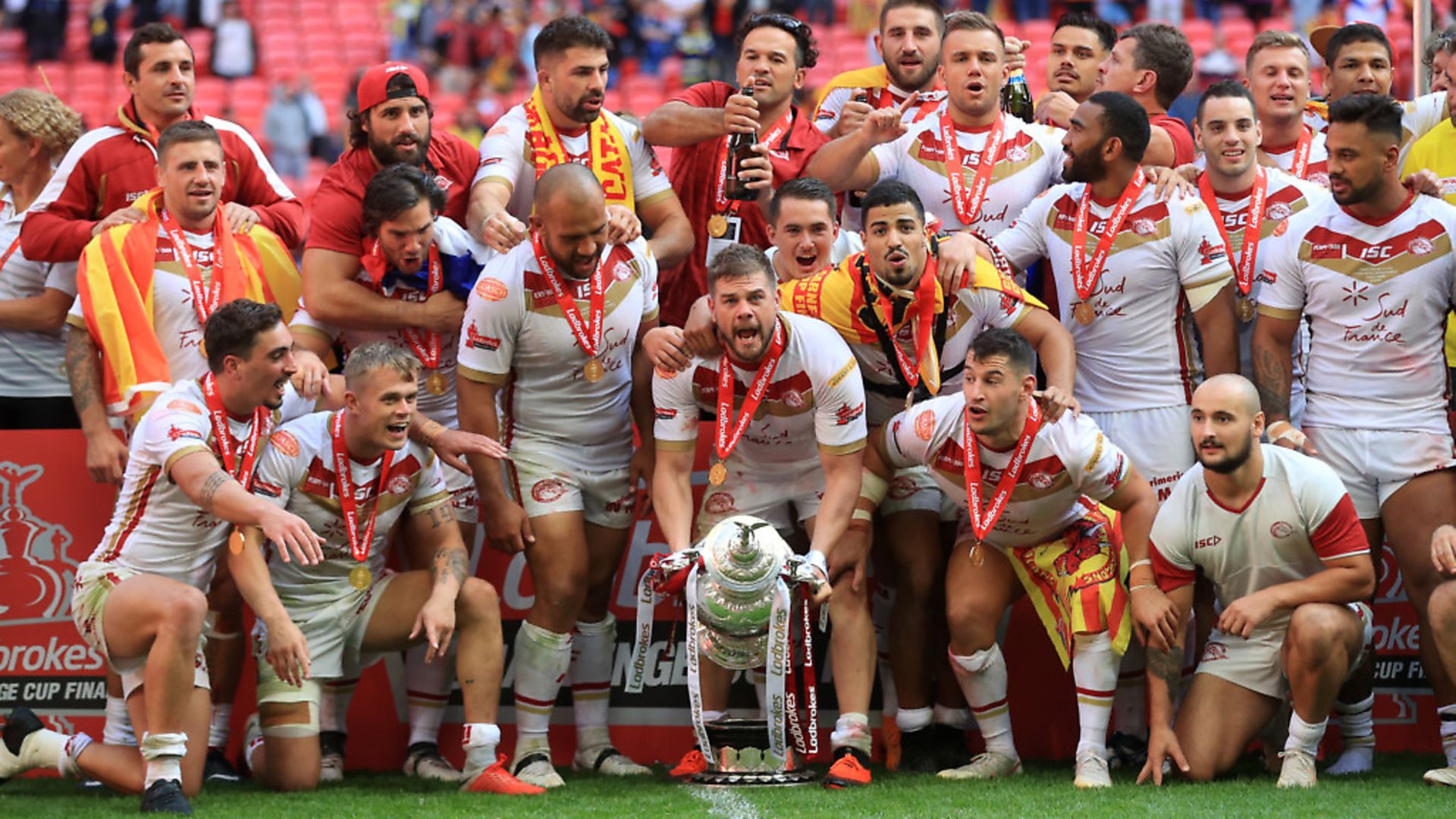
The Catalan club’s historic Challenge Cup success is a win for rugby’s other code, says Paul Knott
European history was made at Wembley last weekend. By winning the 121-year-old Rugby League Challenge Cup, France’s Catalans Dragons become the first overseas team to lift a major British domestic sports trophy.
The Catalans’ landmark victory in a thrilling final against Warrington was built by bolstering local talent and grit with international expertise. The Dragons’ veteran warrior of a captain, Remi Casty, Lance Todd Trophy-winning man-of-the-match, Tony Gigot and the French core of the team are backed by Australian, Irish, English, Kiwi and Papua New Guinean teammates. And they are brilliantly led by a coach from Hull, Steve McNamara.
The club is based in the far south-western French city of Perpignan. With its warm weather, nearby beaches and distinctive Catalan culture, the area is ostensibly a world away from rugby league’s supposed heartlands in the post-industrial north of England.
But McNamara has frequently remarked that Perpignan’s character is far removed from the wealthy playgrounds of Nice and Monaco. It is a place where people struggle for everything they have and the coach feels completely at home amidst its staunchly working-class values.
Indeed, the Dragons’ success defies the privileged Brexit leaders’ propaganda that the international working classes are doomed to scuffle over meagre pickings. Rather than needing to be ‘protected’ from each other by hard borders, the grand old trophy gleaming on the Catalans sideboard proves the people are stronger when they work together.
It is no accident that this remarkable European sporting triumph happened first in rugby league. The game itself sprang from an 1895 social revolution, when a group of northern clubs split with the Rugby Football Union. The schism followed a dispute over the northern clubs compensating working-class players for the wages they lost by taking time off work to play.
The English elites who ran rugby union had sought to end a run of northern victories by banning such ‘broken time’ payments and imposing a strict code of amateurism (or ‘shamateurism’ as it became known, given union’s penchant for making underhand payments to players when it suited it to do so).
Since the split, rugby league has built a trailblazing record of openness and inclusivity. Way back in the late 1950s, the legendary Roy Francis became the first black British professional coach in any sport, guiding major clubs such as Hull FC and Leeds to many successes.
Francis’ fellow Welshman, Clive Sullivan, was the first black captain of a UK national team and lifted the World Cup for Great Britain in 1972. Ellery Hanley created another example most major sports have yet to follow by becoming Great Britain coach in 1994.
In 1995, Ikram Butt was the first British Asian to represent England in either code of rugby and Australian international star Ian Roberts set a worldwide precedent by coming out as gay at the peak of his career.
The audacious inclusion of a French team in the top-flight English Super League competition 13 years ago was, then, par for the course for rugby league. Since then, the Catalans have been joined by Toulouse Olympique, who are currently vying for promotion from the second tier with, astoundingly, the world’s only transatlantic sports club, the Toronto Wolfpack.
Rugby league’s routine flouting of convention does not disguise the magnitude of Catalans’ achievement though. On the pitch, the cup win represents a remarkable turnaround from surviving relegation in last season’s sudden death ‘Million Pound Match’ play-off. The subsequent revamping of the squad and playing style took time to bed-in, leaving the Dragons bottom of the league with only two wins from the first 11 games of this year before the barnstorming run of form that culminated at Wembley.
The challenge of fortnightly travel to games in England from a place with no convenient direct flights can never be underestimated either.
But these difficulties are positively prosaic compared to the trials French rugby league as a whole has had to overcome. As in the UK, few of its players and fans come from the wealthiest or most powerful sections of society.
Since the game first swept to prominence in France in the 1930s, the elite-run rugby union has mostly seen the freer-flowing 13-a-side league code as a mortal enemy that might seduce its audience away.
The union authorities have repeatedly used their power and connections to attempt to destroy league. Notoriously, during the Second World War, rugby union officials exploited their involvement in the Nazi-puppet Vichy regime to have rugby league banned and seize its assets and facilities.
Despite such assaults, rugby league has survived in certain stubborn areas of France. Adversity has strengthened the bonds between its adherents. The closeness of the Catalan people to their players has been even more in evidence than usual during the recent cup run.
Under the emotional but astute leadership of chairman and local butcher, Bernard Guasch, the Catalans are a heart-warming throwback to the days when top professional sports clubs were less corporate and more grounded in their communities.
This appealing character and the unique away trip they offer has made the Catalans Dragons many British rugby league fans’ second favourite team. Anyone who prizes endeavour, openness and internationalism is welcome to join us in saluting their magnificent achievement.
Warning: Illegal string offset 'link_id' in /mnt/storage/stage/www/wp-includes/bookmark.php on line 357
Notice: Trying to get property 'link_id' of non-object in /mnt/storage/stage/www/wp-includes/bookmark.php on line 37






